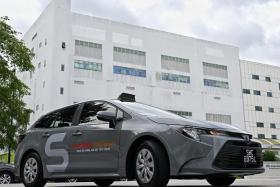Khaw: No rush to adopt new technologies for transport
Transport Minister says S'pore's approach is to explore wide range of platforms before selecting solutions
Singapore will not rush to be the first in adopting "new-fangled technologies" for essential services like public transport, Transport Minister Khaw Boon Wan said yesterday.
The country's approach, he said, is to explore a wide range of technology platforms before selecting a few promising solutions, based on "hard-headed calculations".
Speaking at the opening of the Intelligent Transport Systems (ITS) World Congress at the Suntec Singapore Convention and Exhibition Centre, Mr Khaw said: "What is crucial is that we are plugged in and are fully aware of what new technologies are available out there."
By taking part in developing such new technologies through joint research, pilots and trials, Singapore can better assess the state of their maturity, he added. "This allows us to better judge the timing for adoption and to scale up wisely."
An intelligent transport system must also be a wise one, he said in an opening speech to participants from over 80 countries in the first ITS congress hosted by Singapore.
"As a transport minister, I look beyond the technology element. Politically, what matters is that we have a transport system that is fast, safe, reliable and, very importantly, affordable for all people," he said.
The system has to contribute to their quality of life - the thing that matters to them most, he added.
He said there is "no one-size-fits-all" model in this sphere. "For instance, what works for Denmark... may not work as well for Singapore. What works for Singapore today may not be suitable in 10 years' time."
In outlining Singapore's experience with developing ITS, Mr Khaw cited how it is gradually upgrading to the next-generation Electronic Road Pricing system.
As for autonomous vehicles, trials and research are being carried out, and a pilot to ply driverless buses and shuttles is planned for Punggol, Tengah and the Jurong Innovation District by 2022.
"I look forward to a larger-scale adoption of autonomous-vehicle technology in Singapore, but I think this will not be in the near future," he said.
There are also technological risks to intelligent systems, he said. He pointed to rail systems, which have traditionally been a "walled garden" - no information goes in or out of the system.
"With the proliferation of sensors and cloud computing, this 'walled garden' is steadily being punctured by external connections to facilitate more efficient rail operations," he said.
"A cyber attacker can potentially take control and sabotage the most intelligent of rail systems. The risks can be mitigated, but it requires constant vigilance, costly investments and staff re-training."
Mr Khaw sees "great potential" in the super-fast 5G cellular network, which the Republic said it will start rolling out over the next few years. The network is needed for the widespread use of autonomous vehicles.
Get The New Paper on your phone with the free TNP app. Download from the Apple App Store or Google Play Store now



